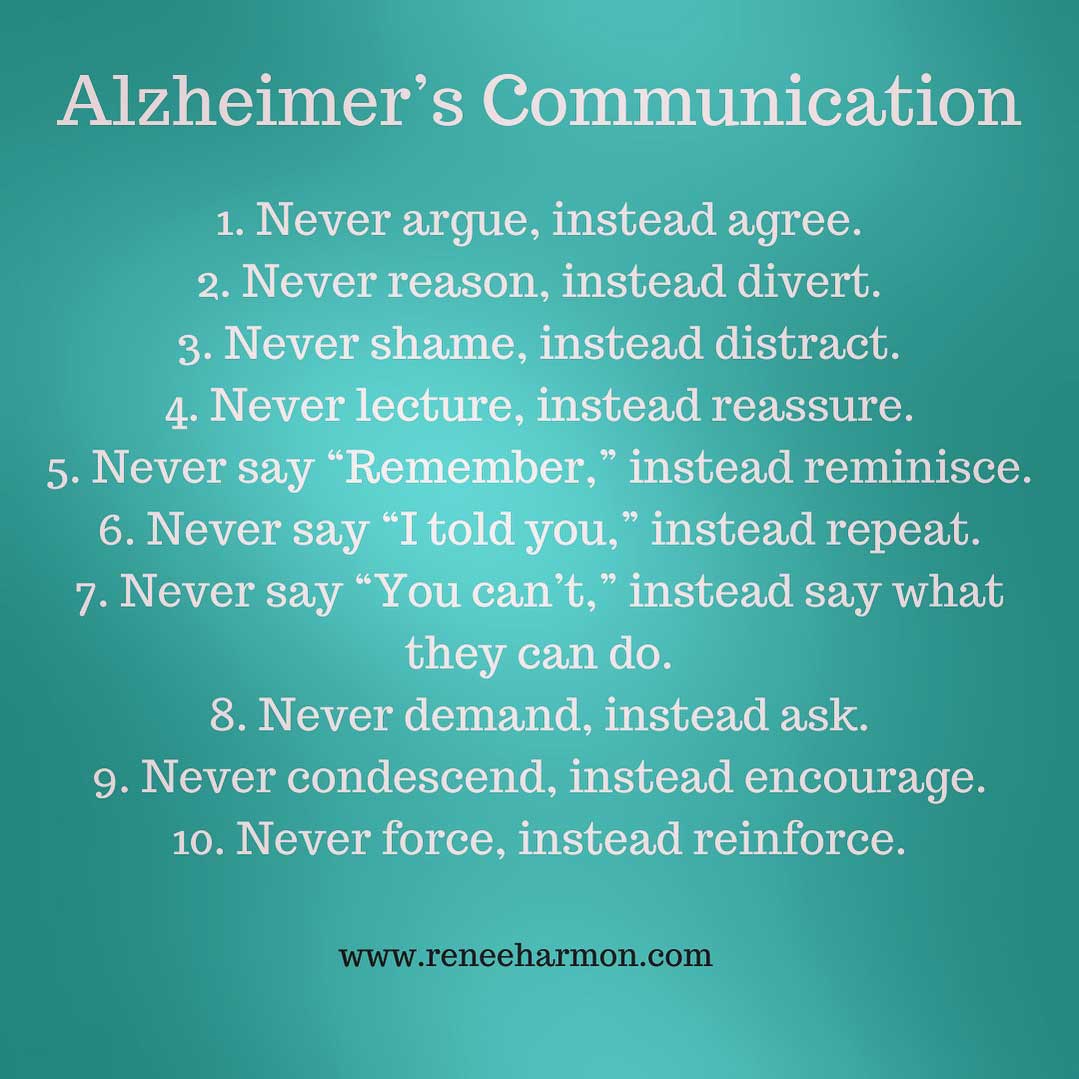
If you’ve been in the Alzheimer’s world for any length of time, you’ve probably seen this list before. I couldn’t find the original source, and no one seems to claim it, so I made one for myself and for you. Now let’s get into this list.
First off, I really dislike the word “never.” Like “forever” and “always,” it is a hyperbole used for emphasis, but rarely precisely accurate. Right? Especially in Alzheimer’s disease, there just doesn’t seem to be absolutes about anything.
So why don’t we agree from the outset that these are goals, tips, suggestions, or ideals? Good!
Why did I start off this conversation this way? Because these are HARD rules to follow!
OK, got that off my chest. Let’s dive in.
The first “suggestion” is one that my support group spent a lot of time on, on multiple occasions. It is very difficult for rational, compassionate, and very human caregivers to let our loved ones say something preposterous and not correct them. Gah! It’s just so hard! Especially if you are in a group of other people and your loved one chimes in with an untruth. How in the world are we supposed to just agree? I never did perfect this skill when Harvey and I were with other people, but I did learn to just agree with whatever crazy thing he said or denied he had done. It just wasn’t worth getting into an argument over. It wasn’t going to resolve. Ever. So I learned to just say, “OK.”
The second one is similar. You just can’t expect your loved one with Alzheimer’s disease to follow a logical, reasonable explanation. Yes, reasoning is better than arguing, but it still won’t work in most instances. So instead of trying to engage in the impossible, you might say, “Would you like some ice cream?” That’s a diversion I can handle.
“Shame.” Oh, boy! That surely doesn’t work! Communicating with words and logic are difficult, but a person with dementia can pick up on emotions and tone of voice just fine. I can’t remember a specific time that I shamed my husband, but I can easily imagine his response if I did. He would have hung his head and maybe even teared up and said, “I’m sorry.” I would have felt terrible! And it wouldn’t have helped anything.
The fourth item is similar to the previous ones in that a person with Alzheimer’s disease just cannot follow a lecture, even if done calmly and logically. There are just too many words for them to process. The term “lecture” implies arguing, and reasoning, and shaming, all rolled into one big disaster! I like the alternative here, though. Reassurance that everything is fine goes a long way to diffuse a difficult situation. Even if it’s not OK, getting your loved one in a better emotional place will de-escalate things.
Why is this so hard? Because you and your loved one are operating on two completely different levels of communication. Their brains are damaged and dying, and they just cannot function at your level.
We’ll look at the rest of the list next week
6 Responses
Love the opening commandments. Number five needs a B in remember ! Btw, imo these work with the elderly who are experiencing age-related decline. Very all-purpose! Thanks!
Lisa,
Shoot! I already redid it once because of a missing T in one instead. Thanks. And really, maybe these rules would be good for all communication!
Renee, I look forward to your blog. It seems you always say something which is just what I need to hear. I have done all of the “nevers” you mentioned and then feel terrible about it. It seems I need constant reminding.
Barbara,
I’m so glad you have found your way here. I appreciate your honesty. It’s only when we look at our situation with honesty that we can be better caregivers. And it’s SO HARD!
This seems so obvious to me after all of these years – and it’s one of the hardest behaviors for a family to adjust.
So hard! And I wonder why some find it more difficult than others?